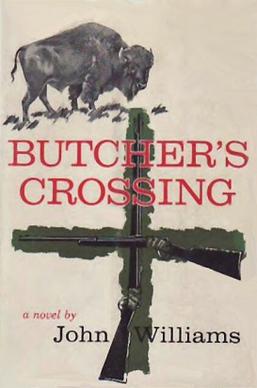Unraveling the Wilderness: A Comprehensive Exploration of “Butcher’s Crossing” by John Edward Williams

Introduction
John Edward Williams, a literary virtuoso, carved a niche for himself in American literature with the publication of “Butcher’s Crossing.” This novel, initially overlooked upon its release in 1960, has since garnered critical acclaim for its poignant exploration of the human condition, the harsh realities of the American West, and the impact of the relentless pursuit of wealth. In this extensive analysis, we will delve into the intricate layers of “Butcher’s Crossing,” examining its narrative depth, thematic richness, character intricacies, and the profound reflections it offers on the American frontier.
Section 1: John Edward Williams – Crafting Literary Landscapes
1.1 The Author’s Odyssey
John Edward Williams, a prolific American author and professor, is renowned for his contributions to literature. Born in 1922, Williams’ literary career spans novels, poetry, and critical works. “Butcher’s Crossing” stands as a testament to his ability to craft narratives that transcend time and resonate with readers across generations.
1.2 An Overlooked Masterpiece
Upon its initial release, “Butcher’s Crossing” did not receive the attention it deserved. However, over time, the novel has been rediscovered and recognized as a literary masterpiece. Williams’ distinctive voice and narrative style have secured his place among the notable figures in American literature.
Section 2: Unveiling “Butcher’s Crossing”
2.1 Synopsis
“Butcher’s Crossing” unfolds against the backdrop of the post-Civil War era in the unforgiving landscape of the American West. The narrative follows the journey of Will Andrews, a young Harvard dropout seeking adventure and meaning in the wilderness. His path converges with that of Miller, Schneider, and Charley Hoge in the remote town of Butcher’s Crossing. Together, they embark on a perilous journey to hunt buffalo, delving into the heart of the unexplored Colorado mountains. The novel chronicles their quest, exploring themes of nature, greed, and the transformative power of the frontier.
2.2 Narrative Structure
Williams employs a narrative structure that combines elements of adventure, realism, and philosophical introspection. The novel unfolds in a multi-layered fashion, allowing readers to witness the characters’ physical and psychological odyssey. Williams’ prose is both evocative and restrained, capturing the essence of the harsh wilderness and the internal struggles of the characters.
Section 3: Characters – Exploring the Human Wilderness
3.1 Will Andrews
The protagonist, Will Andrews, serves as the lens through which readers experience the harsh realities of the American frontier. Will’s journey from the intellectual confines of Harvard to the untamed landscapes of Butcher’s Crossing becomes a poignant exploration of disillusionment, self-discovery, and the transformative impact of the wild.
3.2 Miller, Schneider, and Charley Hoge
The supporting characters, Miller, Schneider, and Charley Hoge, each bring a unique dimension to the narrative. Miller, the seasoned buffalo hunter, embodies the relentless pursuit of wealth; Schneider represents resilience in the face of adversity; and Charley Hoge serves as a harbinger of wisdom and reflection. Together, their dynamics create a tapestry of human experiences in the unforgiving wilderness.
Section 4: Themes Explored – Nature, Greed, and the Human Spirit
4.1 The Wilderness as a Character
“Butcher’s Crossing” elevates the wilderness to the status of a character. Williams paints a vivid and unforgiving portrait of nature, emphasizing its transformative power and the challenges it poses to those who dare to confront it. The novel becomes a meditation on the sublime beauty and inherent dangers of the natural world.
4.2 Greed and the Pursuit of Wealth
Greed serves as a central theme, driving the characters to the extremes of the wilderness in pursuit of buffalo hides. Miller’s relentless ambition becomes a metaphor for the insatiable desire for wealth that characterized the era. Williams explores the consequences of unchecked greed and the toll it takes on individuals and the environment.
4.3 The Human Spirit and Resilience
Amidst the harsh realities of the frontier, “Butcher’s Crossing” also delves into the resilience of the human spirit. The characters, confronted by physical challenges and moral dilemmas, grapple with their own capacities for endurance and self-discovery. Williams contemplates the human condition and its ability to endure, adapt, and find meaning in the face of adversity.
Section 5: Literary Craftsmanship
5.1 Prose and Descriptive Mastery
Williams’ prose in “Butcher’s Crossing” is marked by its descriptive richness and literary craftsmanship. His ability to evoke the stark beauty of the landscape, the brutality of the hunt, and the internal conflicts of the characters is a testament to his mastery of language. The novel’s sensory depth immerses readers in the sights, sounds, and emotions of the American West.
5.2 Philosophical Reflections
Intertwined with the narrative is a layer of philosophical reflection. Williams invites readers to contemplate the human experience, the consequences of human actions on the environment, and the moral complexities inherent in the pursuit of personal desires. “Butcher’s Crossing” transcends its adventure narrative, offering profound insights into the human psyche.
Section 6: Critical Acclaim and Contemporary Reception
6.1 Contemporary Rediscovery
While “Butcher’s Crossing” initially received limited attention upon its release, contemporary readers and critics have rediscovered its brilliance. The novel’s themes, literary craftsmanship, and timeless relevance have earned it a place among the classics of American literature. Williams’ ability to capture the essence of the human experience resonates with a new generation of readers.
6.2 Critical Acclaim
In retrospect, “Butcher’s Crossing” has garnered critical acclaim for its exploration of the American frontier, its commentary on human nature, and its contribution to the Western literary tradition. Scholars and literary enthusiasts recognize the novel as a work of enduring significance, standing alongside other classics of the genre.
Section 7: John Edward Williams’ Impact on American Literature
7.1 Shaping the Western Literary Canon
John Edward Williams’ impact on American literature extends beyond “Butcher’s Crossing.” The novel, along with his other works, has contributed to shaping the Western literary canon. Williams’ ability to transcend genre conventions and offer nuanced explorations of the human condition has influenced subsequent generations of writers.
7.2 Legacy and Influence
Williams’ legacy lies in his profound influence on literature and his ability to craft narratives that transcend time and place. The themes explored in “Butcher’s Crossing” resonate with contemporary readers, highlighting the enduring relevance of Williams’ insights into human nature, the environment, and the quest for meaning.
Section 8: Conclusion – Navigating the Wilderness of Existence
In conclusion, “Butcher’s Crossing” by John Edward Williams stands as a literary odyssey that navigates the wilderness of existence. Through its evocative prose, complex characters, and profound reflections on nature and human nature, the novel invites readers to confront the harsh realities of the American frontier and the complexities of the human spirit.
Williams’ legacy is not only in crafting a Western masterpiece but also in contributing to the broader conversation about the human experience. “Butcher’s Crossing” endures as a testament to the power of literature to transcend time, offering readers a profound and contemplative journey through the untamed landscapes of the American West.







